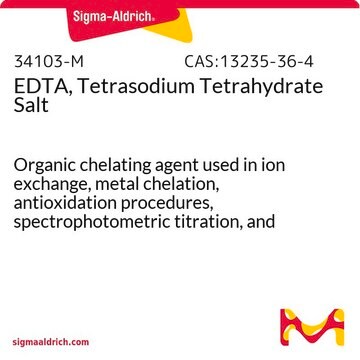324503
EDTA, Disodium Salt, Dihydrate, Molecular Biology Grade
Synonym(s):
Ethylenediaminetetraacetic acid disodium salt dihydrate, Ethylenediaminetetraacetic Acid, 2Na, Disodium ethylenediaminetetraacetate dihydrate, EDTA disodium salt, EDTA-Na2, Edathamil, Edetate disodium salt dihydrate, Sequestrene Na2
About This Item
Recommended Products
grade
Molecular Biology
Quality Level
form
crystalline solid
reaction suitability
reagent type: chelator
manufacturer/tradename
Calbiochem®
storage condition
OK to freeze
desiccated (hygroscopic)
color
white
mp
248 °C (dec.) (lit.)
solubility
water: 186 mg/mL (0.5M)
foreign activity
DNases, proteases, RNases, none detected
shipped in
ambient
storage temp.
10-30°C
SMILES string
O.O.O.O.[Na+].[Na+].[Na+].[Na+].OC(=O)CN(CCN(CC([O-])=O)CC([O-])=O)CC(O)=O.OC(=O)CN(CCN(CC(O)=O)CC([O-])=O)CC([O-])=O
InChI
1S/C10H16N2O8.2Na.2H2O/c13-7(14)3-11(4-8(15)16)1-2-12(5-9(17)18)6-10(19)20;;;;/h1-6H2,(H,13,14)(H,15,16)(H,17,18)(H,19,20);;;2*1H2/q;2*+1;;/p-2
InChI key
OVBJJZOQPCKUOR-UHFFFAOYSA-L
Looking for similar products? Visit Product Comparison Guide
Application
Warning
Preparation Note
Reconstitution
Legal Information
signalword
Warning
hcodes
Hazard Classifications
Acute Tox. 4 Inhalation - STOT RE 2 Inhalation
target_organs
Respiratory Tract
Storage Class
11 - Combustible Solids
wgk_germany
WGK 2
flash_point_f
Not applicable
flash_point_c
Not applicable
Certificates of Analysis (COA)
Search for Certificates of Analysis (COA) by entering the products Lot/Batch Number. Lot and Batch Numbers can be found on a product’s label following the words ‘Lot’ or ‘Batch’.
Already Own This Product?
Find documentation for the products that you have recently purchased in the Document Library.
Customers Also Viewed
Our team of scientists has experience in all areas of research including Life Science, Material Science, Chemical Synthesis, Chromatography, Analytical and many others.
Contact Technical Service






